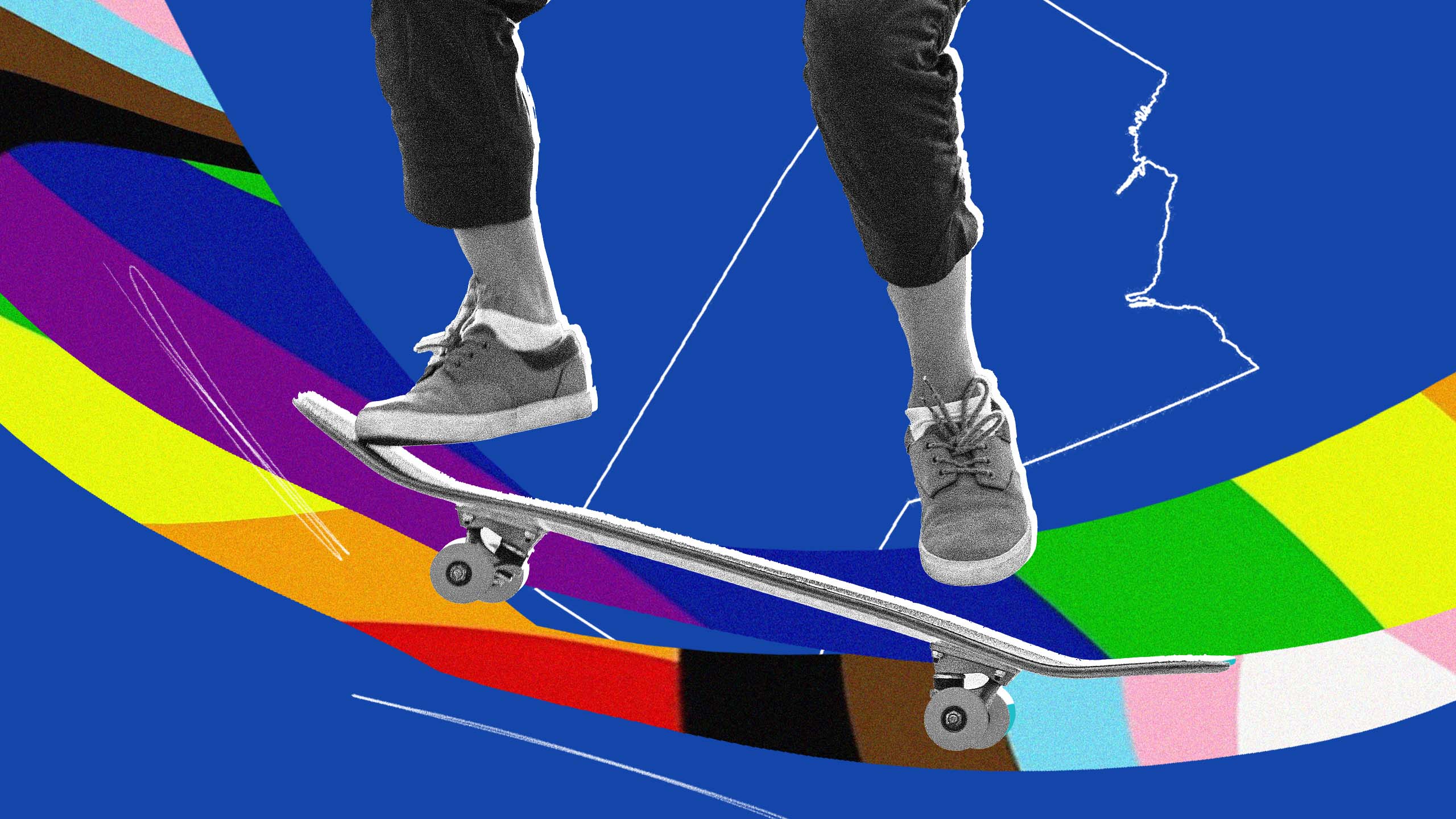The evangelical organization that runs Winnipeg’s largest indoor skate park has been accused of repeatedly discriminating against LGBTQ2S+ people—and local queer skaters have had enough.
The Winnipeg chapter of Youth for Christ (YFC), an international, non-denominational Christian ministry, runs The Edge skate park in Manitoba’s most populous city, where skaters say that senior staff have repeatedly curbed attempts at LGBTQ2S+ inclusivity.
Former volunteer Maddy Nowosad told CBC News that she realized the skate park was discriminatory when her zine about LGBTQ2S+ skaters, as well as her proposal to start a weekly queer and trans skate night, were both rejected by senior YFC leadership. She started skating at The Edge in 2019, and volunteering soon after.
“As soon as I was told that the zine and the LGBTQ2S+-centred sessions and events weren’t welcome in this space, that was the first time that I realized that it wasn’t actually a safe space,” Nowosad told the broadcaster.
Other skateboarders have also spoken up about the skate park’s policies. Nowosad’s partner, Emilie Rafnson, who used to work at The Edge, has raised concerns over the wording of the skate park’s employment contract. Employment and volunteer contracts, seen by CBC, contain a clause promising to uphold “the purity and sanctity of sexual relations within marriage which we believe is a committed union between one man and one woman.” These policies are not unique to The Edge—YFC employees working with other programs have also come forward and accused the organization of discrimination in recent days.
Longtime skater Megan McKay said that at a women’s skateboarding night at The Edge in 2019, she saw YFC staff members asking for pamphlets promoting resources for LGBTQ2S+ people and safer drug use to be put away.
And former staffer Geoff Reimer, who worked at The Edge for 13 years, told CTV Winnipeg that he left his job after running into opposition to queer and trans skate nights. “That was the beginning of the end for me, because I cared more about the rights and the freedom of the queer community in the skateboard scene than my job at that point.”
In an email to Xtra, Nowosad said that the women’s skateboarding nights hosted at The Edge were a safe space for the LGBTQ2S+ skating community in Winnipeg because they were volunteer-run and no actual employees were there.
“The process for becoming a volunteer at Youth for Christ Winnipeg used to be more ‘lax,’ for lack of a better word. Most volunteers were unaware of the policies, and others were aware, but reassured they did not need to be in agreement with them,” Nowosad told Xtra.
“This all began to change in the summer of 2020 when Youth for Christ staff became aware that one of their employees and volunteer (myself) was publicly queer. Fast forward to the present day, and they strictly enforce their policy, which has resulted in loss of staff and volunteers.”
A message on The Edge Skatepark’s website states it has “a shortage of staffing this fall,” is “currently without staff,” and is only running youth sessions for skaters aged 12 to 17 due to lack of workers.
Despite receiving large amounts of public money in the form of government grants, the organization does not seem to be bound by non-discrimination laws. Manitoba’s municipal relations minister Eileen Clarke told CBC News that there were no anti-discrimination clauses attached to funding. “We are not the employer here. We are just the funder.… They are responsible for their policies, and we don’t set their policies.”
Reporting from CBC found that YFC Winnipeg had received $357,000 through the federal summer jobs grant, $446,000 in provincial funding and $3.2 million from the City of Winnipeg through the CentreVenture Development Corporation.
In a statement posted to their website, YFC said it is “deeply saddened hearing that parts of this community have felt excluded at the Edge, or that some youth (members of the 2SLGBTQ+) have felt unsafe in our facilities and programs.”
The statement continued, “All young people are welcomed and valued at Youth for Christ … regardless of religious belief, people group or sexual orientation.” This language mirrors that on other YFC-associated websites, including YFC Comox Valley’s website, as well as on YFC Winnipeg’s “Indigenous Settler Relations” page.
Now, Nowosad, Reimer and others have started the Manitoba Skateboarding Coalition to set up an inclusive indoor skatepark as an alternative to The Edge. Winnipeg sees snow on the ground for as many as six months every year, meaning indoor parks are essential for local skaters.
The group’s GoFundMe campaign has raised almost CAD $11,000 so far, a bit under halfway to its $26,000 goal. They have also started a petition, which has garnered 1,600 signatures.
“I started skateboarding when I was about eight years old, so, in 2008,” Nowosad told Xtra. Although she took a break from 2013 to 2018 due to a lack of social connections, her love of the sport never went away.
She said the women’s skate nights at The Edge (which were trans- and non-binary-inclusive) were dedicated to “welcoming everyone who entered the space with open arms,” and believes that setting up a new skate park is important to make sure nobody is left out.
“Skate spaces organized by and for LGBTQ2S+ skaters have helped me feel safe to take up space at skate parks, and be my authentic self.”


 Why you can trust Xtra
Why you can trust Xtra


